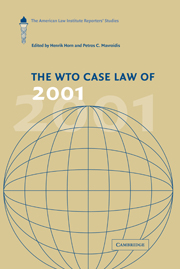Book contents
- Frontmatter
- Contents
- Foreword
- A note on the American Law Institute
- List of reporters
- 1 Introduction
- 2 EC – Asbestos European Communities – Measures Affecting Asbestos and Asbestos-Containing Products
- 3 US – Shrimp United States – Import Prohibition of Certain Shrimp and Shrimp Products, Recourse to Article 21.5 of the DSU by Malaysia
- 4 US – Lamb United States – Safeguard Measures on Imports of Fresh, Chilled or Frozen Lamb Meat from New Zealand and Australia: What Should Be Required of a Safeguard Investigation?
- 5 EC – Bed Linen European Communities – Anti-Dumping Duties on Imports of Cotton-Type Bed Linen from India
- 6 Mexico – Corn Syrup Mexico – Anti-Dumping Investigation of High Fructose Corn Syrup from the United States, Recourse to Article 21.5 of the DSU by the United States
- 7 Argentina – Ceramic Tiles Argentina – Definitive Anti-Dumping Measures on Imports of Ceramic Floor Tiles from Italy
- 8 US – Lead and Bismuth II United States – Imposition of Countervailing Duties on Certain Hot-Rolled Lead and Bismuth Carbon Steel Products Originating in the United Kingdom: Here Today, Gone Tomorrow? Privatization and the Injury Caused by Non-Recurring Subsidies
- 9 US – Export Restraints United States – Measures Treating Export Restraints as Subsidies
- 10 Canada - Dairy Canada – Measures Affecting the Importation of Dairy Products and the Exportation of Milk
- 11 US – Section 110(5) Copyright Act USt – Section 110(5) of the US Copyright Act, Recourse to Arbitration under Article 25 of the DSU: Would've or Should've? Impaired Benefits due to Copyright Infringement
- Index
- References
10 - Canada - Dairy Canada – Measures Affecting the Importation of Dairy Products and the Exportation of Milk
Published online by Cambridge University Press: 06 July 2010
- Frontmatter
- Contents
- Foreword
- A note on the American Law Institute
- List of reporters
- 1 Introduction
- 2 EC – Asbestos European Communities – Measures Affecting Asbestos and Asbestos-Containing Products
- 3 US – Shrimp United States – Import Prohibition of Certain Shrimp and Shrimp Products, Recourse to Article 21.5 of the DSU by Malaysia
- 4 US – Lamb United States – Safeguard Measures on Imports of Fresh, Chilled or Frozen Lamb Meat from New Zealand and Australia: What Should Be Required of a Safeguard Investigation?
- 5 EC – Bed Linen European Communities – Anti-Dumping Duties on Imports of Cotton-Type Bed Linen from India
- 6 Mexico – Corn Syrup Mexico – Anti-Dumping Investigation of High Fructose Corn Syrup from the United States, Recourse to Article 21.5 of the DSU by the United States
- 7 Argentina – Ceramic Tiles Argentina – Definitive Anti-Dumping Measures on Imports of Ceramic Floor Tiles from Italy
- 8 US – Lead and Bismuth II United States – Imposition of Countervailing Duties on Certain Hot-Rolled Lead and Bismuth Carbon Steel Products Originating in the United Kingdom: Here Today, Gone Tomorrow? Privatization and the Injury Caused by Non-Recurring Subsidies
- 9 US – Export Restraints United States – Measures Treating Export Restraints as Subsidies
- 10 Canada - Dairy Canada – Measures Affecting the Importation of Dairy Products and the Exportation of Milk
- 11 US – Section 110(5) Copyright Act USt – Section 110(5) of the US Copyright Act, Recourse to Arbitration under Article 25 of the DSU: Would've or Should've? Impaired Benefits due to Copyright Infringement
- Index
- References
Summary
Introduction
This paper summarizes and critically reviews the dispute brought before the World Trade Organization (WTO) concerning Canada – Measures Affecting the Importation of Dairy Products and the Exportation of Milk, euphemistically referred to herein as Canada – Dairy. This dispute is centered on the WTO Agricultural Agreement, though it also involves the WTO Subsidies and Countervailing Measures (SCM) Agreement and GATT – 1994.
Many analysts have argued that a significant accomplishment of the Uruguay Round of negotiations was the development of a set of rules on agricultural supports, that covered the three main policy instruments of such support: border measures, domestic supports, and export subsidies. The national commitments made as part of the Agreement on Agriculture clearly represented just the beginning of agricultural reform, reflected by the fact that agriculture was earmarked as part of the built-in agenda going forward. It is widely recognized that the agricultural sector is one of the most highly subsidized sectors in the world. Liberalization of trade in agriculture was deemed the “linchpin” of the Uruguay Round for the United States and a number of other jurisdictions. It remains controversial today. Hence, this political and economic backdrop adds a special importance to this dispute.
Contextually the dispute is also significant because it brings to light the systemic question of whether the Agriculture Agreement and the SCM Agreement are structured and drafted to strike the proper balance among the support measures, especially when there are spillover consequences of domestic support measures on export markets.
- Type
- Chapter
- Information
- The WTO Case Law of 2001The American Law Institute Reporters' Studies, pp. 236 - 280Publisher: Cambridge University PressPrint publication year: 2004

